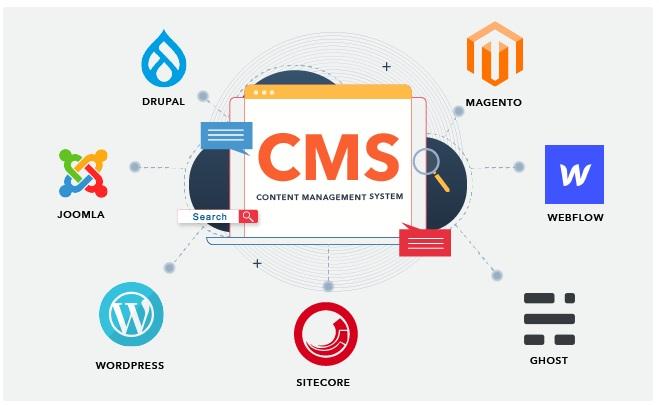Content Management System: Simplifying the Management of Digital Content

Introduction
In today’s digital era, managing and delivering content effectively is crucial for businesses and individuals alike. A crucial function of a Content Management System (CMS) is streamlining the tasks of content creation, arrangement, and online publication. This article explores the ins and outs of CMS, its advantages, types, key features, popular options, and tips for successful content management.
What is a Content Management System (CMS)?
A CMS is a software application that allows users to create, modify, and manage digital content without requiring extensive technical knowledge. It provides a user-friendly interface that enables content creators to focus on producing high-quality content rather than dealing with technical complexities.
Advantages of Using a Content Management System
3.1 Increased Efficiency and Productivity
A CMS streamlines content creation and management processes, saving time and effort. Content creators can collaborate seamlessly, leading to increased productivity and faster content updates.
3.2 Easy Content Updates and Publishing
With a CMS, updating and publishing content becomes a breeze. Content can be scheduled for automatic publishing, allowing for timely delivery and consistent updates.
3.3 Enhanced Collaboration and Workflow
CMS enables multiple users to work together on content, fostering collaboration and improving overall workflow. It offers role-based access, ensuring that only authorized users can modify specific content.
3.4 Improved Website Security
CMS platforms come with built-in security features to protect digital assets from unauthorized access and cyber threats. Regular security updates and patches help maintain a secure environment.
Types of Content Management Systems
An array of diverse CMS options exists, designed to accommodate distinct requirements and user preferences.
4.1 Web-Based Content Management Systems
Web-based CMS operates through a web browser, allowing users to manage content from any device with internet access. It offers convenience and flexibility, making it a popular choice for individuals and small businesses.
4.2 Self-Hosted Content Management Systems
Self-hosted CMS requires users to install the software on their own web server or hosting platform. It provides more control over the website and data, making it a preferred option for larger organizations.
4.3 Enterprise Content Management Systems
Large-scale organizations with extensive content management requirements can use enterprise content management systems. It offers advanced features such as document management, business process automation, and integration with other enterprise systems.
How Does a Content Management System Work?
A CMS operates on a backend database, storing all digital content and associated metadata. The frontend, or user interface, allows content creators to interact with the system, making content creation and management intuitive and straightforward.
Key Elements that Define a Robust Content Management System
When choosing a CMS, consider the following essential features:
6.1 User-Friendly Interface
A user-friendly interface simplifies content creation and editing tasks, ensuring a smooth experience for all users.
6.2 Customization Options
A CMS with extensive customization options allows you to tailor the appearance and functionality of your website according to your unique needs.
6.3 Scalability and Flexibility
Choose a CMS that can grow with your business and accommodate changing requirements over time.
6.4 SEO-Friendly Capabilities
An SEO-friendly CMS enables better search engine visibility, helping your content reach a wider audience.
6.5 Integration with Third-Party Tools
Select a CMS that seamlessly integrates with third-party tools, such as email marketing platforms, analytics, and e-commerce solutions.
Popular Content Management Systems
There are several popular CMS options available, each with its own strengths and suitability for different purposes.
7.1 WordPress
WordPress is one of the most widely used CMS platforms, renowned for its simplicity, versatility, and vast plugin library.
7.2 Joomla
Joomla is a robust CMS that offers extensive customization options and is ideal for building complex websites.
7.3 Drupal
Drupal is known for its scalability and is a preferred choice for large-scale websites with heavy traffic.
7.4 Magento
Magento is a leading CMS for e-commerce websites, providing a wide range of features for online stores.
7.5 Shopify
Shopify is a user-friendly CMS designed specifically for e-commerce businesses, making it easy to set up and manage an online store.
Choosing the Right Content Management System for Your Needs
Selecting the most suitable CMS depends on factors such as your technical expertise, website requirements, budget, and long-term goals. Consider your specific needs and explore the features offered by various CMS platforms before making a decision.
Tips for Successful Content Management
Effective content management requires a well-thought-out strategy and consistent effort. Follow these tips to make the most out of your CMS:
9.1 Organize Your Content Effectively
Create a clear and logical content structure to help users navigate your website easily.
9.2 Create a Content Publishing Schedule
Consistency is key in content creation. Develop a publishing schedule to maintain a steady flow of fresh content.
9.3 Optimize Your Content for SEO
Ensure your content is optimized with relevant keywords and metadata to improve search engine rankings.
9.4 Monitor and Analyze Content Performance
Regularly track the performance of your content and make data-driven decisions to enhance engagement and conversion rates.
Challenges of Content Management Systems
While CMS offers numerous benefits, there are challenges that users may encounter:
10.1 Learning Curve
Some CMS platforms have a steep learning curve, requiring time and effort to become proficient.
10.2 Security Risks
As with any digital system, CMS platforms can be vulnerable to security breaches if not properly maintained and updated.
10.3 Maintenance and Updates
Regular maintenance and updates are necessary to ensure optimal performance and security, which can be time-consuming.
The Future of Content Management Systems
The future of CMS is likely to focus on enhancing user experience, artificial intelligence integration for personalized content recommendations, and improved security measures.
Conclusion
In conclusion, a Content Management System is a powerful tool that simplifies content creation, organization, and publishing. It enhances collaboration, improves productivity, and ensures better website security. Choosing the right CMS, following best practices, and staying updated with the latest trends will pave the way for successful content management in the digital age.